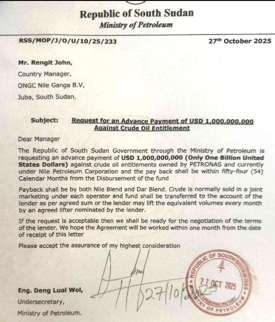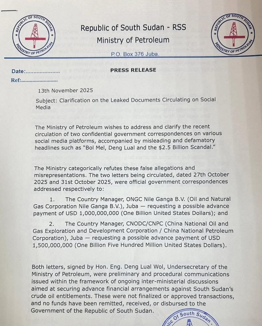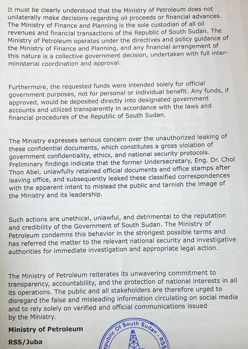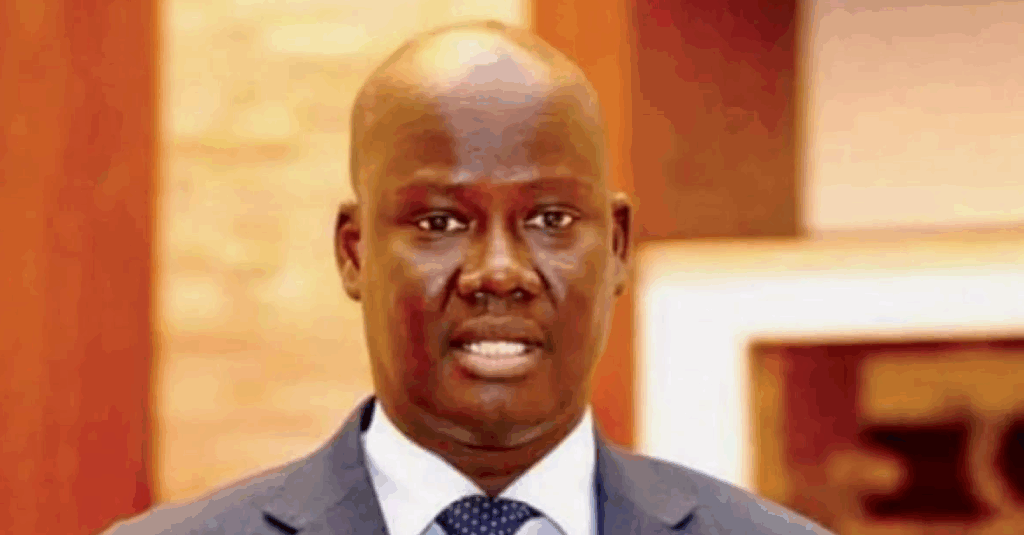South Sudan’s Ministry of Petroleum on Thursday strongly repudiated that leaked correspondence from the ministry to two international oil companies operating in the country, asking for advance payments to the tune of USD2.5 billion, was an attempt by former Vice President and other officials to embezzle funds, but was a confidential government communication.
On Monday, President Salva Kiir dismissed Eng. Chol Thon Abel as the undersecretary at the petroleum ministry, just a week after appointing him, and reinstated Eng. Deng Lual Wol, who was dismissed from the same post last week.
A press statement that was not signed but with the ministry’s stamp, accused the immediate former undersecretary, Eng. Dr. Chol Thon Abel of being behind the leakage for ulterior motives and said an investigation with plans for prosecution are underway. The two documents (attached) have since gone viral on social media.
“The Ministry of Petroleum wishes to address and clarify the recent circulation of two confidential government correspondences on various social media platforms, accompanied by misleading and defamatory headlines such as ‘Bol Mel, Deng Lual and the $2.5 Billion Scandal.’ The Ministry categorically refutes these false allegations and misrepresentations,” the statement reads in part. “The two letters being circulated, dated 27th October 2025 and 31st October 2025, were official government correspondences addressed respectively to the Country Manager, ONGC Nile Ganga B.V. (Oll and Natural Gas Corporation Nile Ganga B.V.), Juba – requesting a possible advance payment of USD 1,000,000,000 (One Billion United States Dollars).”

“The second letter was to the Country Manager, CNODC/CNPC (China National Oil and Gas Exploration and Development Corporation / China National Petroleum Corporation), Juba – requesting a possible advance payment of USD 1,500,000,000 (One Billion Five Hundred Million United States Dollars),” the statement added.
The ministry said both letters, signed by Eng. Deng Lual Wol, Undersecretary of the Ministry of Petroleum, was preliminary and procedural communications issued within the framework of ongoing inter-ministerial discussions aimed at securing advance financial arrangements against South Sudan’s crude oil entitlements.
“These were not finalized or approved transactions, and no funds have been remitted, received, or disbursed to the Government of the Republic of South Sudan,” the statement reads. “It must be clearly understood that the Ministry of Petroleum does not unilaterally make decisions regarding oil proceeds or financial advances.”
“The Ministry of Finance and Planning is the sole custodian of all oil revenues and financial transactions of the Republic of South Sudan,” it added.
According to the statement, the petroleum ministry operates under the directives and policy guidance of the Ministry of Finance and Planning, and any financial arrangement of this nature is a collective government decision, undertaken with full inter-ministerial coordination and approval.
“Furthermore, the requested funds were intended solely for official government purposes, not for personal or individual benefit,” the ministry said.
“The ministry expresses serious concern over the unauthorized leaking of these confidential documents, which constitutes a gross violation of government confidentiality, ethics, and national security protocols,” the statement reads in part. “Preliminary findings indicate that the former Undersecretary, Eng. Dr. Chol Thon Abel unlawfully retained official documents and office stamps after leaving office, and subsequently leaked these classified correspondences with the apparent intent to mislead the public and tarnish the image of the Ministry and its leadership. Such actions are unethical, unlawful, and detrimental to the reputation and credibility of the Government of South Sudan.”
“The Ministry of Petroleum condemns this behavior in the strongest possible terms and has referred the matter to the relevant national security and investigative authorities for immediate investigation and appropriate legal action,” the statement added.






